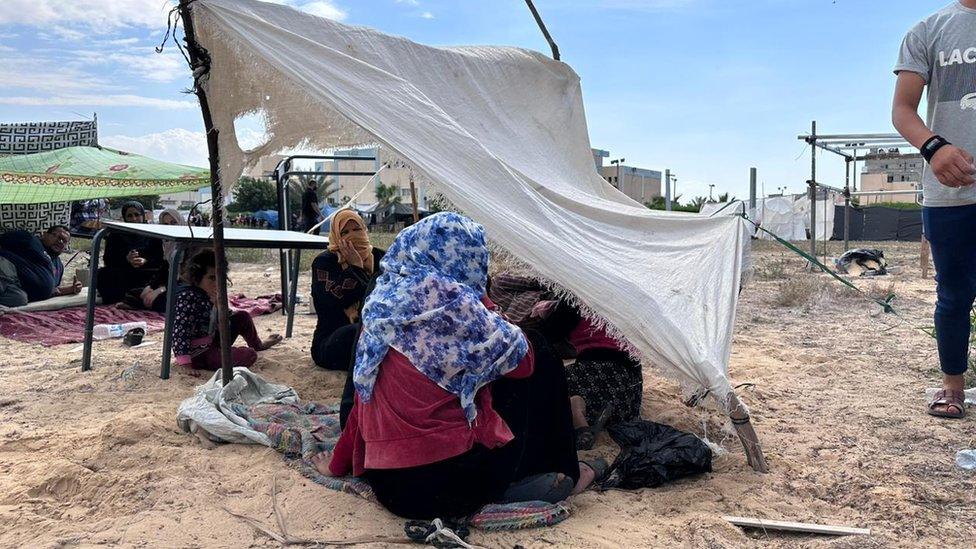Gaza war: Vigil aims to pressure Israel's leaders over hostages
- Published
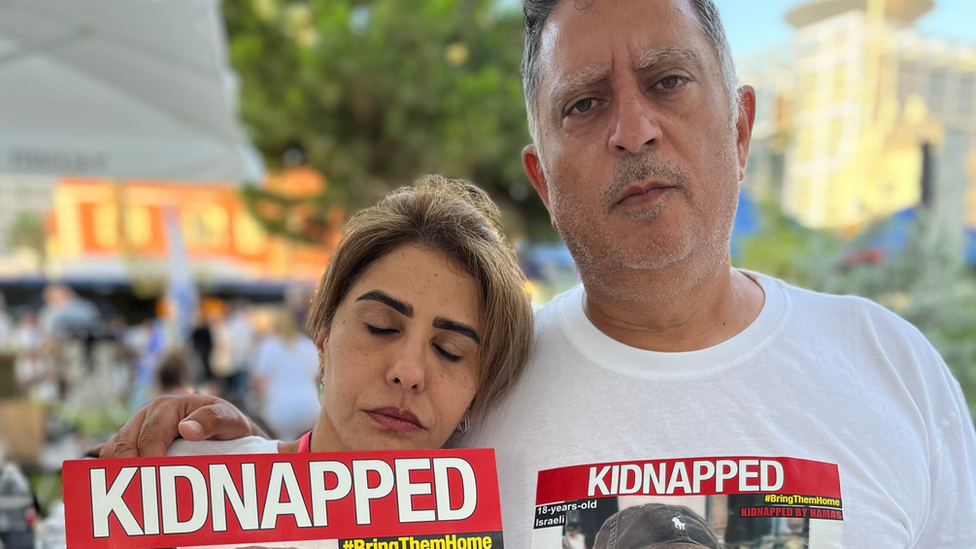
Shira and Eli Albagh are keeping a vigil in Tel Aviv for their kidnapped daughter Liri
"They don't say anything, we have no information", Shira Albagh says, holding a poster of her kidnapped daughter up towards the windows of the Israel Defence Forces' headquarters.
"Liri needs to be back in her bed. She's 18 years old but she's my little baby and I want her back. I want to hug her. I want her back home."
Shira and her husband Eli are among the hostage families keeping a pavement vigil in Tel Aviv. Israeli flags fly alongside pictures of the kidnapped - there are yellow ribbons tied around the trees.
Banners urge action from the military leadership: "Bring our children home", "Prisoner exchange". There's also a sign saying "Bibi must resign" - the nickname Prime Minister Benjamin Netanyahu is widely known by in Israel.
Mr Netanyahu is not seeing the public support that often swells around wartime leaders. Opinion polls show a majority of Israelis think he should stand down when the conflict is over.
His approval rating has slumped and a survey of Jewish voters last week showed two thirds would opt for someone else.
There is anger about the security failure that allowed Hamas to kill so many people and take 200 hostages.

More on Israel-Gaza war
Follow live: Latest updates
Explained: What evidence tell us about Al-Ahli hospital blast
History behind the story: The Israel-Palestinian conflict
From Israel: Community frozen as Hamas atrocities emerge
From Gaza: BBC reporter flees Israel bomb warning

The Albaghs are, like so many hostage families, wary of stepping into politics or criticising the leaders they are relying on to save their daughter, but their faith in their country has been shaken.
"We want the government to put its attention…to talk with them (Hamas) to release the kidnapped", Eli says.
Shira says she holds Israel responsible for failing to keep her daughter safe but also the rest of the world for not recognising the threat of Hamas.
She remains confident that Israel will bring the hostages home, somehow. Polling shows support for the military is still strong.
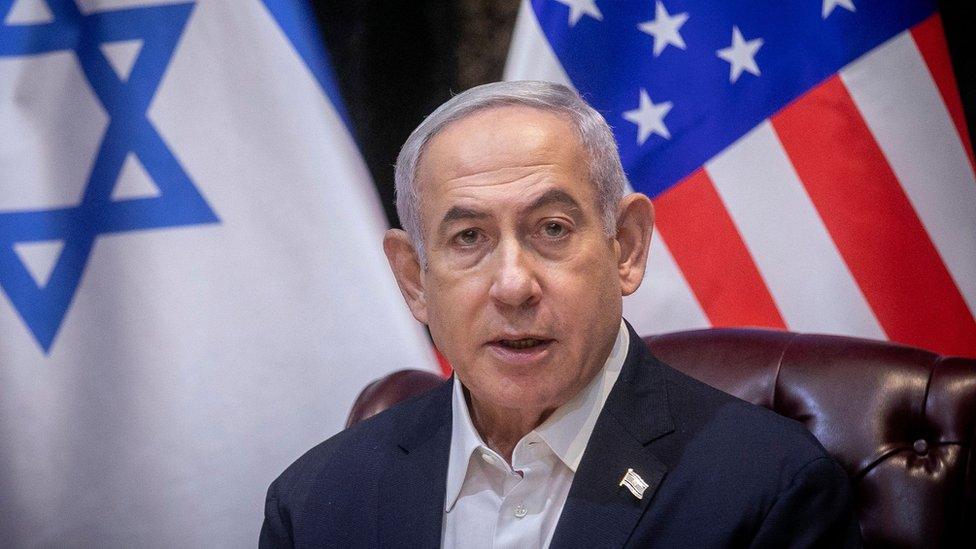
Benjamin Netanyahu's approval rating has slumped since the attacks by Hamas on 7 October
Mr Netanyahu, the longest-serving Israeli leader, had already faced months of divisive protests over planned constitutional changes. He is also charged with corruption.
"He (Netanyahu) is evil" declares Slomit Kobner, who has just been told her friend Mayanna Herschovitz's body has been found in her kibbutz near Gaza.
"He cannot lead Israel. I don't see any way he or his government can stay. The pain is so bad."
In a text message at 11:15 local time (08:15 GMT) on the morning of the attacks, Mayanna said her family had been hiding from gunmen for more than three hours but the army still hadn't arrived to save them.
That is the last Slomit heard from her friend - she was hoping they'd been kidnapped.
Slomit is left wing and has protested against Mr Netanyahu for years: "Now everybody in Israel knows that he can't be anymore the prime minister after this," she says.
"He can go now, or he can go after."
Mr Netanyahu, 73, has served three times as prime minister over 16 years in office. He casts himself as a strong man dedicated to national security.
His own brother was killed in action leading a successful special forces raid - Operation Entebbe - to rescue Israeli hostages held in Uganda after the hijacking of a flight from Tel Aviv in 1976.
But in this crisis Mr Netanyahu has been criticised for being slow to embrace the families of hostages but quick to turn to the US for support.
Families are waiting to hear how the kidnapped will be returned. Many Israelis wonder exactly how the declared "war on Hamas" will be fought.
Even longstanding supporters are questioning Mr Netanyahu's future.
"The leadership have failed, they're in a very bad position" says Dor Harlap, who co-chairs a Jewish cultural organisation called Zionist Horizon.
"After the war he should go to the public with the results of the war and ask for another chance. I'm not sure the public will give it to him. I'd vote for him but maybe this is the last session of Netanyahu."
This year's demonstrations - the largest in Israel's history - followed years of restive politics and three prime ministers in 18 months.
Dor, a committed Likud party voter, worries aging leaders are growing out of touch but wants responsibility taken more collectively.
"The right wing and the left wing had the same agenda about Hamas and Gaza in the last 10 or 15 years. Maybe we should have new leadership for all of the parties."
He's also critical of the widespread protests against Mr Netanyahu's judicial reforms.
Thousands of reserve servicemen and woman threatened to join the revolt by refusing their orders because of concerns the plan to limit the checks and balances of Israel's supreme court would undermine Israel's democracy. Israel's president warned the country was heading for civil war.
"Our enemies see that we are divided," Dor says.
"They see that in the military itself there are protestors and people who wouldn't agree to serve. They've been waiting for our weak point and this instability of the government isn't good for us."
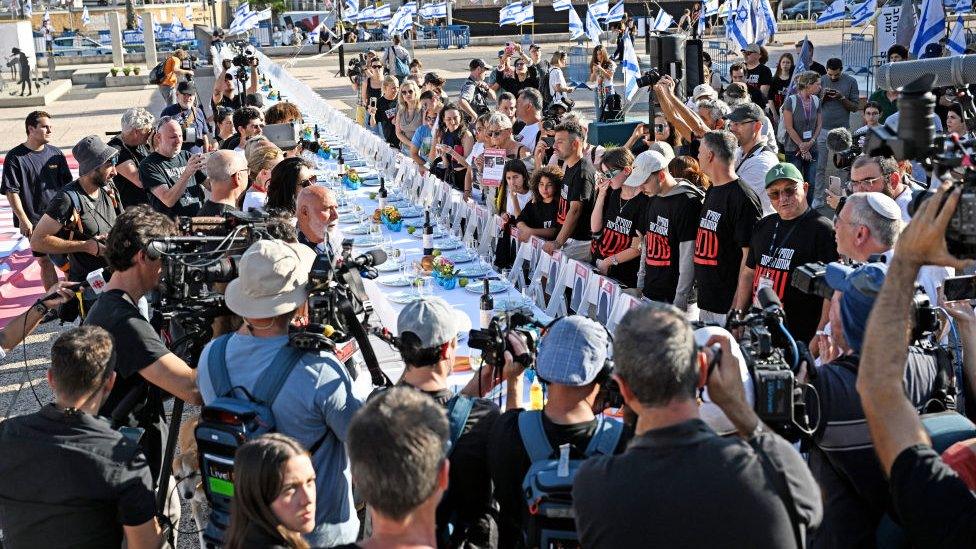
Families of Israeli hostages take part in a special prayer service in Tel Aviv, with empty seats representing their loved ones
At the family's vigil, a car draws up and a man shouts that the months of protest have undermined national unity and let Hamas capitalise. A crowd gathers and a woman screams back as the police step in.
"This man tells me Bibi [Netanyahu] is the king, he's the best man in the world… I can't bear it" she says, enraged.
"I have no country, I have only people. I wish they [Hamas] took Bibi instead of the children and all his government because they are not doing anything. For 10 days the state has been running by volunteers."
A young man who has watched this confrontation play out pulls me aside further down the street. He is the quiet voice of Netanyahu support, nervous of giving his name.
"He [Netanyahu] must carry on in this war" the man says determinedly.
"I wish more citizens were like me, encouraging Bibi to have courage - be Churchill, not Chamberlain. Even if the world says otherwise, show what real moral superiority really is."
Another air raid sends people running to the shelters once more - political divisions dropped under the common threat of Hamas rockets.
"You have to understand we are facing our worst enemy since the Nazis, and the internal political situation…no one really cares about it" says Dor Harlap.
"Most of the people are caring about their own families, their relatives in the reserves. We are caring about winning this war, then after that we'll go to elections, and we will kick out who we need to kick out."
Related topics
- Published1 November 2023
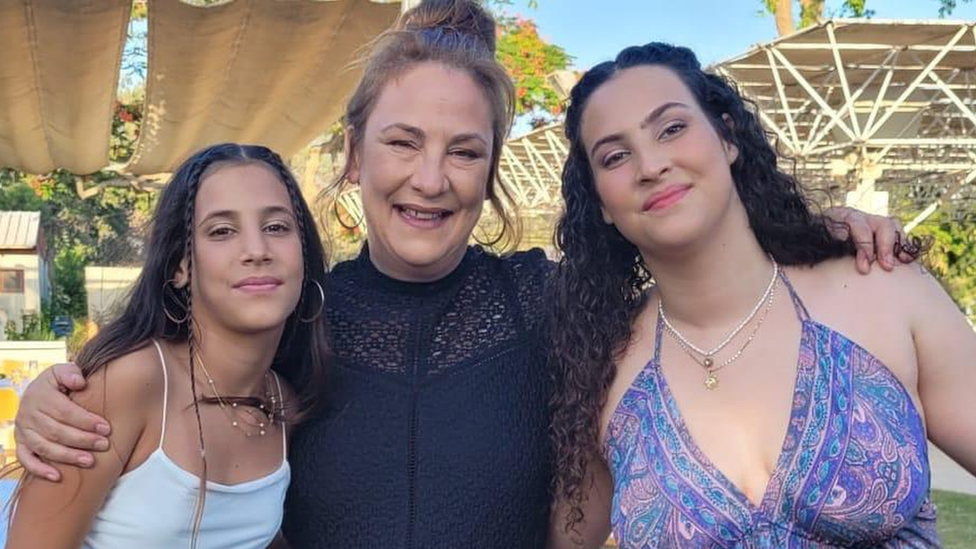
- Published20 October 2023
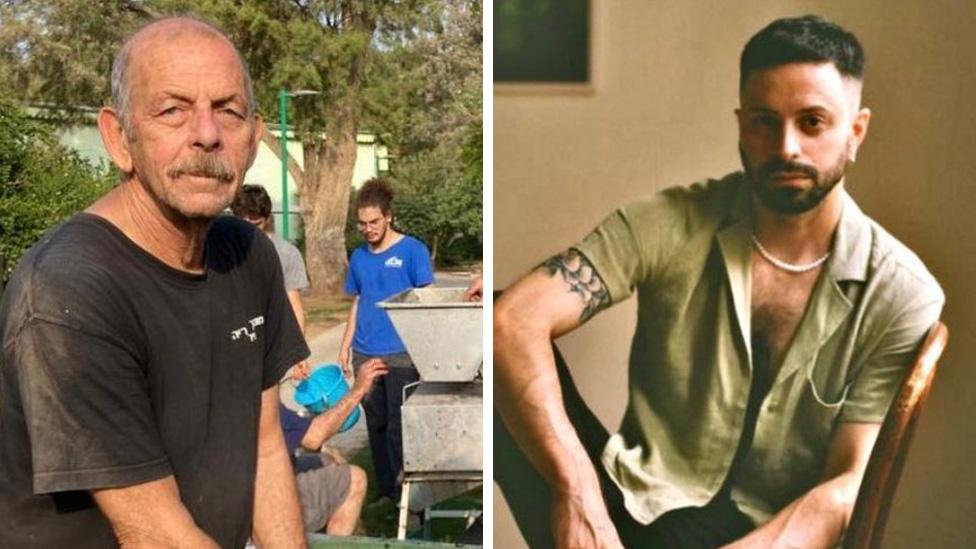
- Published19 October 2023
